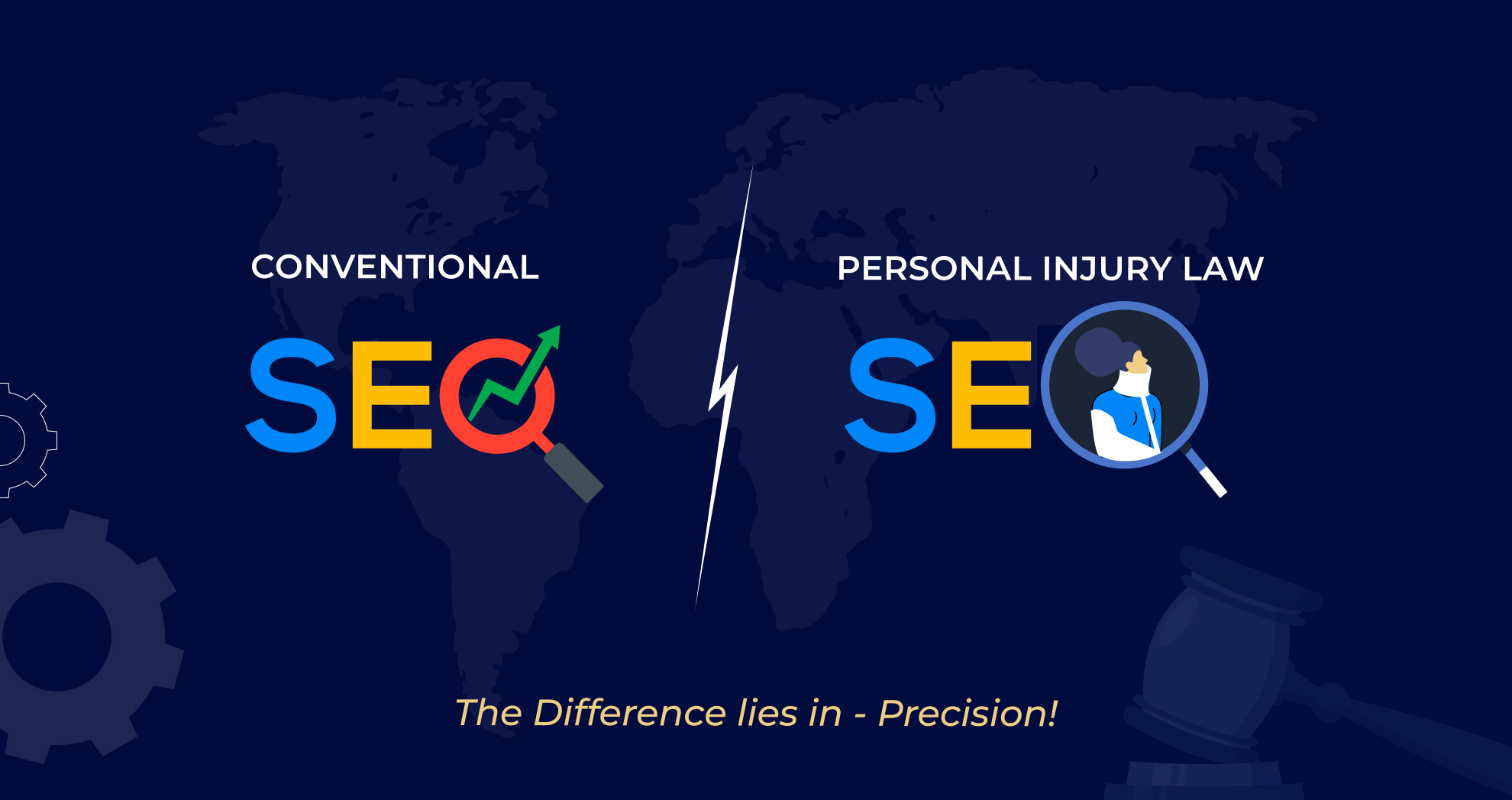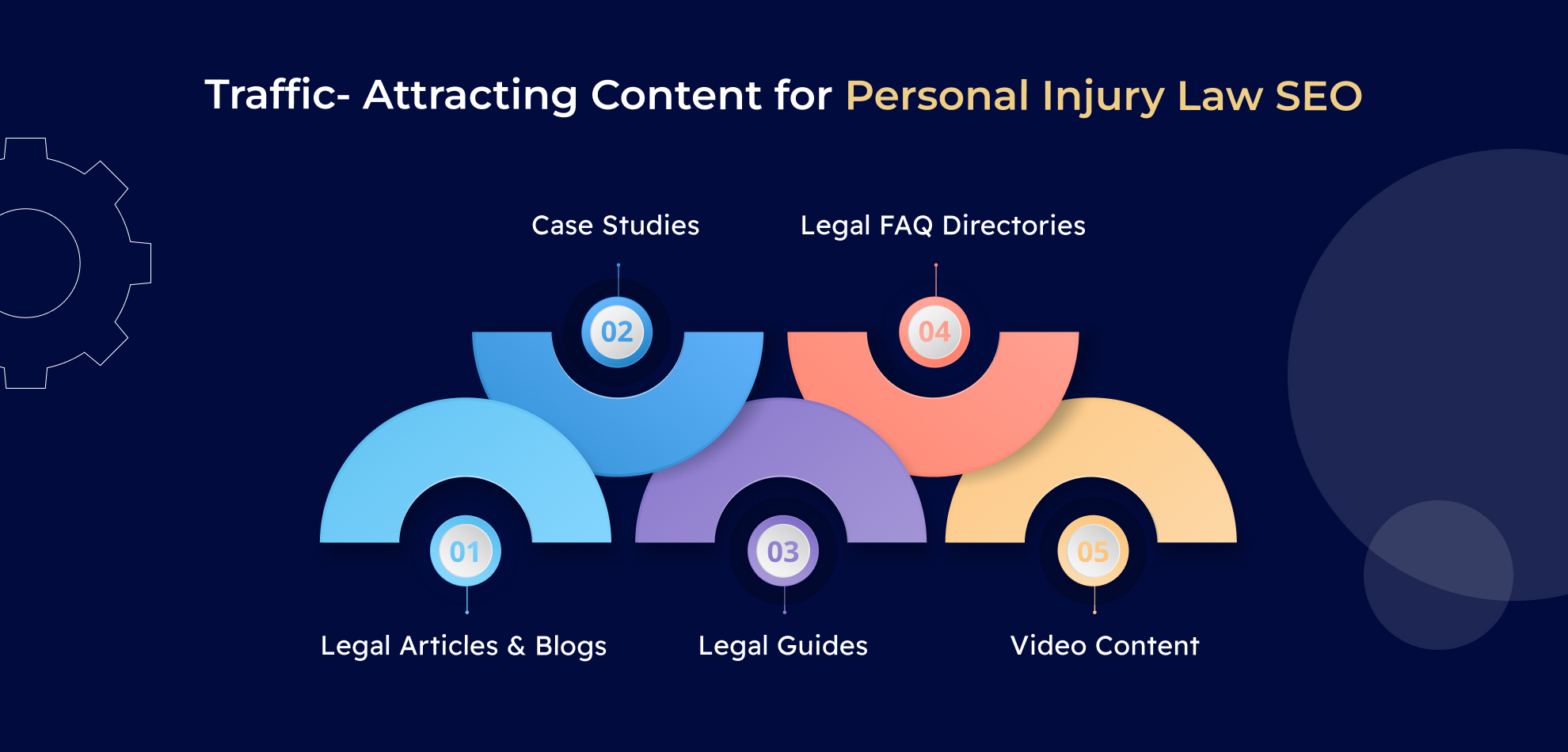The Ultimate Guide to SEO for Personal Injury Lawyers to Improve Visibility

 13 min
13 min
Introduction
The fight for clients in the digital era begins long before it occurs in the courtroom on search engines. Should a prospective customer be in an accident and seek legal assistance, first will they locate you or your competitors? Here is where personal injury lawyers SEO really shines.
Online search visibility immediately affects the success of your company unlike word-of-mouth or conventional advertising. Your law firm is losing out on very valuable clients who are actively looking for legal counsel if it is not ranking highest on Google. For personal injury lawyers, SEO determines much of the difference between winning a new case and losing it to a competitor in fiercely competitive personal injury litigation.
The worst is that personal injury law companies cannot rely only on broad SEO strategies. For personal injury lawyers, they require a planned, airtight approach catered to search engine optimization that recognizes legal sector intricacies, targets the appropriate personal injury keywords, and fosters confidence with search engines.
What then precisely is SEO for personal injury lawyers, and why is it so important for the growth of your company? Allow me to dissect it here.
What is Personal Injury SEO?
Optimizing a legal firm's website for search engines is the goal of search engine optimization (SEO), a subset of digital marketing. It guarantees that your firm shows first on search results when someone searches in terms like "best personal injury attorney near me" or "car accident lawyer in [city].
This is more than just filling your website with personal injury keywords and wishing for the best though. For personal injury lawyers, SEO is an exacting process comprising:
- Website optimization: Your website needs to load quickly, be mobile friendly, and present a flawless customer experience.
- High-quality legal content: Creating educational, interesting, and legally accurate blog entries, FAQs, and landing pages addressing possible customer questions helps to provide high-quality legal information.
- Local SEO tactics: Local SEO strategies include improving Google Business Profile, creating local citations, and obtaining client comments to show up in local searches.
- Backlink building: Establishing credibility by means of authority connections from legal directories, news sites, and industry publications helps to build backlinks.
Unlike standard SEO, SEO strategy for personal injury lawyers must be very focused on intent-based searches and extremely localized. The objective is not only to increase traffic but also to draw the proper type of clients who currently require legal counsel.
Importance of SEO for Personal Injury Lawyers
Think twice if you believe a superb website by itself would generate instances. The legal market is fiercely competitive, hence clients looking for a lawyer sometimes only glance at the first few Google results. Without SEO for personal injury law, even the most outstanding lawyers find it difficult to be seen.
Why does SEO matter for personal injury law firms?
1. Most Clients Start Online
Unbelievably, a Google search starts many legal investigations. Your company will be invisible to possible customers if it is not ranking.
2. Pay-Per-Click (PPC) Ads Are Expensive
Paid ads are expensive—especially in legal niches where competition pushes up ad rates—even though they can create leads. For personal injury lawyers, search engine optimization is a long-term investment that generates natural visibility, therefore lessening dependence on paid ads.
3. Trust & Credibility
Organic search results appeal to clients more than advertising. Having a strong Google ranking shows credibility and power, which increases the likelihood of prospects choosing your company.
4. Outrank Your Competitors
Many personal injury companies aggressively fund SEO. You are already lagging if you are not. For personal injury lawyers, a well-executed SEO plan will help your company to become the preferred choice in your area.
5. Higher-Quality Leads
SEO for personal injury draws people who are actively looking for legal assistance, thus unlike social media ads or cold outreach—meaning they are more likely to become paying clients.
How is Personal Injury Law SEO Different from Conventional SEO?

Think twice—especially regarding personal injury law—if you believe SEO is only about Google ranking. SEO for personal injury attorneys is not the same as maximizing a tech website or fashion blog. The stakes are larger, the competition is more strong, and the search intention is urgent. Searching for a personal injury attorney usually results in someone in pain, juggling growing medical expenses, or unclear of their legal rights. They need answers quickly; they are not leisurely exploring.
This urgency drives the differences in SEO strategies used by personal injury attorneys. Unlike other sectors where brand recognition and long-term involvement count, here the objective is clear: find, get in touch, and get recruited.
1. Hyper-Targeted Search Intent
No time for filler when people are looking for legal assistance. They want reliable knowledge and quick responses. For this reason, search engine optimization for personal injury lawyers has to center on highly intended keywords such as:
- “Top-rated personal injury lawyer near me”
- “Car accident attorney free consultation”
- “How much compensation can I get for a personal injury case?”
Your content should explicitly address these issues. Not a lot of vague language. No needless narrative. Basically straightforward, useful, and action-oriented material.
2. Local SEO is Everything
A Chicago personal injury company has no need of ranking in Los Angeles. Law firms, unlike e-commerce companies, rely on hyperlocal SEO—that is, your Google Business Profile, local directories, and geo-targeted content are not negotiable. Show up where prospective customers are looking for evaluations, case studies, and easily available unambiguous contact information.
3. The Competition is Fierce
Among the most competitive sectors available online is the legal one. Law firms commit thousands of dollars to marketing, thus you are not only facing competition from tiny local businesses but also from companies with strong financial capability. Without a strong SEO plan for personal injury lawyers, even a top-notch attorney can be buried among low-cost rivals.
4. Content Needs to Be Legal-Compliant & Authoritative
Legal SEO demands credibility and compliance unlike in other sectors where you can be laid back. Every bit of information has to be correct, legally sound, and show knowledge. Here especially important are Google's E-E-A-T (Experience, Expertise, Authority, and Trustworthiness) values.
Simply said, SEO for personal injury calls for a laser-like approach that fits search purpose, local exposure, and legal reputation. Let us dissect just how to create this plan.
Your Clients can't hire you if they can't find you. Don’t let them miss out on justice!
Elevate your online presence with expert SEO by Edifying Voyages
Hire SEO Experts
SEO Strategy for Personal Injury Lawyers
The SEO plan of a law company is about long-term visibility and trustworthiness, not about short fixes. As the 24/7 lead generator for your company, a well-optimized website can attract possible customers even during non-active advertising. How then can you ensure your company comes up just when someone wants legal assistance?
Step 1: Mastering the Right Personal Injury Keywords
Keyword research is not about sloppily putting legal language into your material. It's about realizing the perspective of your client. When a lawyer is needed, what are they typing into Google? You have to match their search pattern with exact personal injury keywords fit for their needs.
Some of the must-target phrases include:
- “Personal injury lawyer free consultation”
- “Best car accident lawyer in [City]”
- “How much is a personal injury claim worth?”
Keywords by themselves, though, are insufficient. They must be subtly included into valuable content meant for conversion and education.
Step 2: Website Optimization That Converts Clicks into Clients
A dealbreaker is a slow, antiquated, or difficult to use website. Imagine a possible customer arriving on your website and discovering poor loading speeds, a messy design, or an unclickable contact form. They'll depart quickly.
To avoid this, your website needs to be:
i) Fast-loading (Google prioritizes speed; clients hate waiting)
ii)Mobile-friendly (most searches happen on smartphones)
iii)Easy to navigate (clear service pages, visible CTAs, and a contact form that works)
Consider your website as your digital receptionist; it should greet, guide guests towards a consultation booking.
Step 3: Dominating Local Search
For personal injury lawyers, local SEO forms the foundation of search engine optimization. Your company must be easily visible just when someone in your city is seeking legal advice.
To dominate local rankings, you must:
- Optimize your Google Business Profile with accurate NAP (name, address, phone number), reviews, and service descriptions.
- Get listed in legal directories like Avvo, FindLaw, and Justia for credibility and backlinks.
- Encourage client reviews—Google loves fresh, positive feedback.
Step 4: Building Authority with Link-Building
SEO is about who links to your website as much as it is about what you have on there. Backlinks—other sites connecting to yours—are votes of confidence according to Google. Not all backlinks, meantime, are produced equally.
A well-planned SEO strategy for personal injury lawyers should focus on:
- Guest posts on legal blogs to establish authority
- Press mentions & citations in local news and legal publications
- Strategic partnerships with community organizations and medical experts
Every backlink you acquire increases the reputation of your website, hence driving it higher on search results.
Content Strategy for Personal Injury Lawyers SEO

SEO without content is like trying to drive without gasoline—it will not get you anywhere. Content is what draws in, teaches, and persuasively inspires prospective customers to believe in your company. The only requirements are that it be legally accurate, interesting, and valuable.
Blogging for Authority and Visibility
Think legal subjects are too dry for blogs? Again consider this. Blogs are used by most successful law firms to promote themselves as trusted advisers and respond to important concerns. Well-written blogs increase targeted traffic to your site and help you rank for long-term keywords.
Some content ideas:
- "What to Do After a Car Accident in [Your City]" – A local guide addressing a common client concern
- "How Long Does a Personal Injury Lawsuit Take?" – A breakdown of realistic timelines
- "Understanding Contingency Fees: What You Pay and When" – Transparency builds trust
Engaging Multimedia Content
Not everyone wants to pursue a 2000-word legal blog. Some like case studies, infographics, and films.
- Video Content: Explain legal processes in a simple, engaging way. Example: “How a Personal Injury Claim Works”
- Infographics: Summarize legal information visually. Example: “5 Steps to Take After an Injury”
- Case Studies: Show real success stories. Clients want proof that you win cases.
FAQs & Featured Snippets for Instant Answers
Potential customers as much as Google enjoys fast, well-organized responses. Optimized for highlighted snippets, a FAQ section can find you right at the top of search results.
Examples of snippet-friendly FAQs:
- “What percentage do personal injury lawyers take?”
- “Do I have to pay if I lose my personal injury case?”
- “How long do I have to file a claim?”
Giving clear, simple, obvious responses increases your trust and increases website clicks.
Local SEO for Personal Injury Attorney
To be honest, a personal injury law firm is almost invisible if it is not showing up in local searches. Law companies mostly depend on local clients unlike e-commerce stores that can serve consumers anywhere. Someone seeking for "personal injury lawyer near me" needs representation right now; they are not looking for broad legal guidance. Local SEO is then quite helpful.
Why Local SEO is a Game-Changer
Most prospective customers definitely do not click to page two and do not scroll past the first few Google results. Your company is losing leads to competition if it falls short of those top results. For personal injury attorneys, SEO should be absolutely focused on local rankings to make sure your practice shows exactly where and when it counts.
Key Local SEO Strategies for Personal Injury Law Firms
1. Google Business Profile Optimization
A completely optimal Google Business Profile (GBP) is unchangeable.This means:
- Correct NAP (Name, Address, Phone Number) consistency across all platforms.
- A detailed business description incorporating personal injury keywords.
- High-quality images of your office, team, and success stories.
- Regularly posting updates and responding to client reviews.
2. Client Reviews Matter—A Lot!
Google appreciates companies with actual, current, and positive reviews. Reviews for your company will help to establish its credibility to possible customers. Invite prior customers to provide honest comments on their experience.
3. Local Citations & Legal Directories
High-authority legal directories such as these should include your law firm:
- Avvo
- FindLaw
- Justia
- Lawyers.com
Being listed in local business directories and news sites also enhances rankings and lends credibility.
4. Location-Based Content
City-specific landing pages, case studies, and FAQs catered to local customers should all be on your website. If your company is located in Chicago, for instance, produce content like:
- “What Are Illinois’ Personal Injury Laws?”
- “How to Find the Best Personal Injury Lawyer in Chicago”
This clarifies your location relevance for search engines, facilitating local search ranking.
5. Hyper-Local Link Building
Backlinks from local news sources, companies, and community organizations increase your local rating and power. Sponsoring local events or legal seminars can also provide backlinks and assist establish reputation.
You fight for your clients; we fight for your visibility.
Optimize your SEO today and make sure Your firm is the first one they call.
Get a Free SEO Audit
How Edifying Voyages Helps Personal Injury Law Firms Boost Their Business with SEO
Edifying Voyages helps you if you're reading this and wondering, "This sounds great, but how do I implement all of it?" Although SEO for personal injury lawyers is difficult, with the correct approach it can make your website a lead generating powerhouse.
What Makes Edifying Voyages Different?
Generic SEO techniques are not something we subscribe to. Personal injury law businesses need a customized strategy, and we absolutely offer that. Our all-encompassing SEO solutions enable companies to attract high-value clients, outperform rivals, and establish long-term reputation.
Our Proven SEO Approach for Personal Injury Law Firms
1. Keyword Research & Competitive Analysis
We find high-intent personal injury keywords that not only generate traffic but also actual customer queries.
2. Website Optimization for Maximum Conversions
A sluggish or badly constructed website drives away possible users. We maximize speed, mobile friendliness, and user experience to keep guests interested.
3. Content That Ranks & Converts
From FAQ sites to blog entries, we create credible, interesting material ranked on Google that addresses actual client inquiries.
4. Google Business Profile & Local SEO Domination
We maximize your Google Business Profile, have your company ranked in important legal directories, and guarantee that local search results explode.
5. Reputation Management & Client Review Strategies
To establish reputation and trust, we assist law firms in running strategic review generating initiatives.
6. High-Quality Link Building & Authority Boosting
Our outreach plans guarantee that your company gets links from local, high-authority legal sites, therefore improving rankings and online reputation.
7. Ongoing Performance Tracking & Strategy Refinement
SEO isn't a one-time solution. To guarantee constant development, we offer thorough performance reports, analytics tracking, and plan tweaks.
Edifying Voyages offers not only SEO but also a data-driven, results-oriented approach that will enable your legal practice to flourish in a very competitive industry.
Before You Go..
Even the best personal injury lawyers can struggle to get customers without a good SEO strategy. SEO for personal injury lawyers is about more than just getting higher in search results; it's also about making your company the go-to for clients in need of legal representation by earning their confidence and authority. In order to keep your company's online presence safe, every detail matters, from having a strong content and link-building plan to being the top local SEO.
Working with an organic SEO agency will therefore make all the difference. A data-driven, long-term SEO strategy guarantees sustained development and a consistent flow of highly valuable leads instead of depending just on temporary strategies. Edifying Voyages is here to help you if you're eager to increase the profile of your company, draw more business, and surpass the competitors. Let's push your personal injury law practice to the top—reach out today and start seeing real results.
FAQs
Personal Injury Lawyer SEO refers to the strategies and practices used to improve a personal injury law firm's visibility in search engine results. By targeting specific keywords and optimizing their website, law firms can attract more potential clients searching for legal services online.
SEO is crucial for personal injury lawyers because it helps them stand out in a highly competitive market. A well-executed SEO strategy can drive more targeted traffic to their website, leading to increased client inquiries and ultimately, more cases.
To measure and analyze SEO performance, personal injury lawyers should track key metrics like organic traffic, keyword rankings, and conversion rates. Tools like Google Analytics and Ahrefs can provide insights into how well their SEO efforts are translating into actual client leads.




